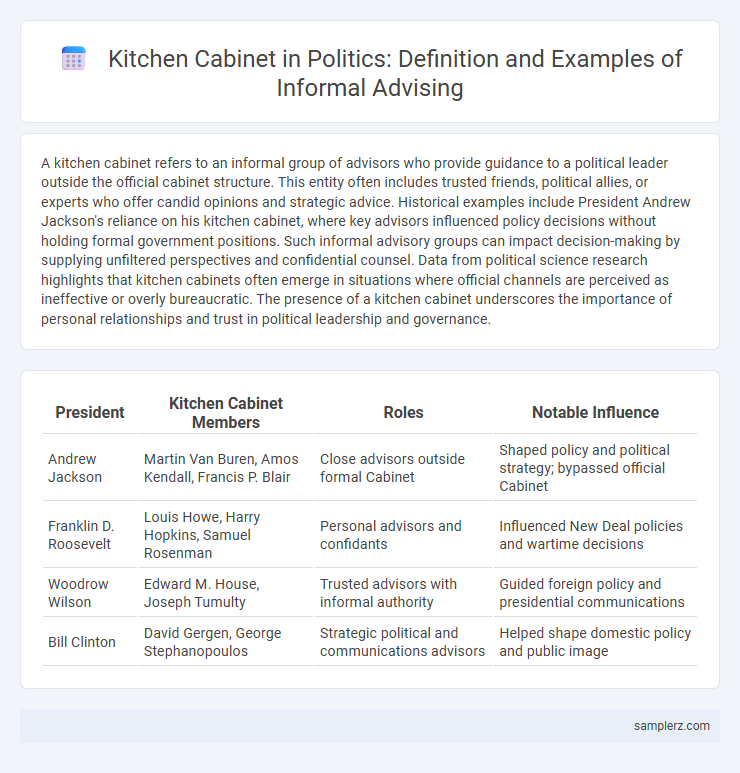A kitchen cabinet refers to an informal group of advisors who provide guidance to a political leader outside the official cabinet structure. This entity often includes trusted friends, political allies, or experts who offer candid opinions and strategic advice. Historical examples include President Andrew Jackson's reliance on his kitchen cabinet, where key advisors influenced policy decisions without holding formal government positions. Such informal advisory groups can impact decision-making by supplying unfiltered perspectives and confidential counsel. Data from political science research highlights that kitchen cabinets often emerge in situations where official channels are perceived as ineffective or overly bureaucratic. The presence of a kitchen cabinet underscores the importance of personal relationships and trust in political leadership and governance.
Table of Comparison
| President | Kitchen Cabinet Members | Roles | Notable Influence |
|---|---|---|---|
| Andrew Jackson | Martin Van Buren, Amos Kendall, Francis P. Blair | Close advisors outside formal Cabinet | Shaped policy and political strategy; bypassed official Cabinet |
| Franklin D. Roosevelt | Louis Howe, Harry Hopkins, Samuel Rosenman | Personal advisors and confidants | Influenced New Deal policies and wartime decisions |
| Woodrow Wilson | Edward M. House, Joseph Tumulty | Trusted advisors with informal authority | Guided foreign policy and presidential communications |
| Bill Clinton | David Gergen, George Stephanopoulos | Strategic political and communications advisors | Helped shape domestic policy and public image |
Defining the Kitchen Cabinet in Political Advising
The Kitchen Cabinet refers to an informal group of trusted advisors who provide private counsel to a political leader outside the official framework of government. This practice often bypasses formal advisory channels, allowing for more candid discussions and swift decision-making. Historical examples include President Andrew Jackson's reliance on close friends and political allies for confidential advice during his administration.
Historical Origins of Kitchen Cabinets in Politics
The term "kitchen cabinet" originated in the presidency of Andrew Jackson in the 1830s, referring to an informal group of trusted advisors who met with the president in the White House kitchen rather than the official Cabinet room. This unofficial advisory body included close friends and political allies like Martin Van Buren and Amos Kendall, influencing key decisions outside formal channels. The concept exemplifies how personalized counsel has shaped American political decision-making beyond institutional frameworks.
Famous Kitchen Cabinet Examples: The Jackson Administration
The Jackson administration's kitchen cabinet exemplifies informal political advising, consisting of close friends and unofficial advisors who influenced President Andrew Jackson's decisions outside the formal cabinet. This group included figures like Martin Van Buren and Amos Kendall, who played critical roles in shaping policies during Jackson's presidency. Their influence highlights the impact of trusted personal advisors on governance and political strategy in early 19th-century America.
The Role of Informal Advisors in Modern Governments
Informal advisors, often referred to as a kitchen cabinet, play a crucial role in shaping policy decisions behind the scenes in modern governments. These trusted confidants provide candid insights and alternative perspectives without the constraints of official protocols, influencing leaders on matters ranging from national security to economic strategy. Their impact is evident in administrations where formal advisory channels are supplemented by personal networks, enhancing responsiveness and strategic agility.
Kitchen Cabinets in Presidential Decision-Making
Kitchen cabinets in presidential decision-making refer to informal groups of advisors who provide direct counsel to the president outside the official Cabinet framework. These trusted aides often influence policy decisions by offering candid, specialized insights, enabling swift and flexible responses. Notable examples include President Andrew Jackson's reliance on his circle of close friends and advisors during his administration.
Global Instances: Kitchen Cabinets Outside the US
In political advisory contexts, the term "kitchen cabinet" extends beyond the United States to describe informal groups of advisors influencing leaders across the globe. For instance, in the United Kingdom, Prime Minister Winston Churchill regularly consulted a close circle of unofficial advisors during World War II, functioning similarly to a kitchen cabinet. In India, Prime Minister Narendra Modi has been known to rely on a trusted inner circle of confidants and experts outside formal cabinet meetings, emphasizing the global prevalence of informal political counsel.
Advantages and Drawbacks of Relying on Kitchen Cabinets
Relying on a kitchen cabinet for political advising offers the advantage of accessing trusted, informal counsel that can expedite decision-making and foster loyalty among key advisors. However, this approach risks reduced transparency, potential groupthink, and the exclusion of diverse perspectives critical for balanced policy development. The concentration of influence within a small circle may compromise democratic accountability and the robustness of the political process.
Notable Political Scandals Involving Kitchen Cabinets
The Watergate scandal exposed how President Nixon's informal kitchen cabinet influenced illegal activities and abuse of power, leading to a constitutional crisis and his resignation. Similarly, Ronald Reagan's administration faced scrutiny when the so-called "kitchen cabinet" members were implicated in the Iran-Contra affair, revealing covert operations bypassing official channels. These incidents highlight the risks when unofficial advisors wield unchecked influence in political decision-making, undermining transparency and accountability.
Contrasting Official Cabinets and Kitchen Cabinets
Kitchen cabinets consist of informal advisors who influence political decisions behind the scenes, often lacking official authority but holding significant sway over the leader's choices. In contrast, official cabinets are composed of formally appointed ministers or secretaries with constitutionally defined roles and public accountability. This informal advisory group can shape policymaking without the transparency and checks associated with official cabinet meetings.
The Impact of Kitchen Cabinets on Political Transparency
Kitchen cabinets, informal groups of trusted advisors, significantly influence political transparency by operating behind closed doors, often bypassing formal decision-making channels. Their secretive consultations can obscure governmental accountability, reducing public insight into policy formation. This opaque advisory process challenges democratic principles by limiting open debate and scrutiny.

example of kitchen cabinet in advising Infographic
 samplerz.com
samplerz.com